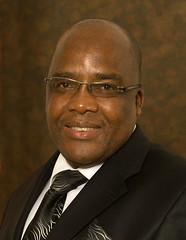
Dr. Aaron Motsoaledi, the Minister of Health in the Republic of South Africa.
Originally uploaded by Pan-African News Wire File Photos
AFRICA COULD BE WORST AFFECTED BY SWINE FLU: MOTSOALEDI
Although Africa was the last continent to be affected by swine
flu, it may become the most severely affected continent, Health
Minister Aaron Motsoaledi said on Tuesday.
"What is of particular concern to us as Africans is that
although the pandemic has spread to our continent last, we may be
more severely affected by it," he said in a speech prepared for
delivery at a World Health Organisation (WHO) conference on the
virus.
There have been at least 177,457 confirmed infections and 1462
deaths globally, according to Agence France Presse, with 1464 cases and two deaths reported in South Africa, according to South
Africa's health department.
The WHO's reported cases for Africa on its website stop at 229
with no deaths as of July 31, but the organisation has warned that
because countries are no longer required to test and report
individual cases, the records underestimate the real number of
incidences.
Motsoaledi said it was well-known that Africa had always been
worst affected by any outbreak of a communicable disease - whether
it was HIV/Aids, tuberculosis, malaria or a hemorrhagic fever.
"It is therefore essential for all countries within the
continent to ensure that we are adequately prepared for all of
these but in the present context prepared to deal with the
influenza pandemic.
"What is of advantage for us is that we can learn from the
experiences of others," he said.
The virus was first detected in Mexico and the United States and
had since spread to all continents.
South Africa's first reported death was of Ruan Muller, a
22-year-old university student from Stellenbosch.
Motsoaledi pointed out that after it became clear globally that
containing the virus was not possible, it became more effective to
mitigate its effects.
Besides the social disruptions, of particular importance to
Africa was the additional strain on health staff, hospital beds,
laboratories and resources.
No comments:
Post a Comment